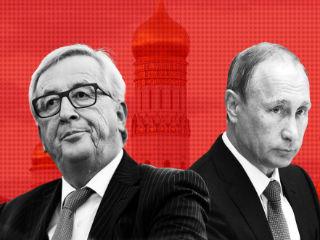European Commission President Jean-Claude Juncker plans to take part in the St Petersburg International Economic Forum on June 16

All the commotion has been heightened because the possible Putin-Juncker meeting in St Petersburg will take place a few days before the Brussels’ summit of EU leaders (28-29 June), where the subject of ‘whether to extend sanctions against Russia’ is one of the most important points on the agenda.
by
N. Peter Kramer
The President’s spokesman Margaritis Schinas told journalists that his boss will ‘convey to the Russian leadership the EU perspective on current state of EU-Russian relations’. Schinas could not confirm whether Juncker would hold any direct talks with President Vladimir Putin, but he said it was ‘evident’ the two would meet at the forum.
Not so long ago President Juncker already called for a ‘practical relationship’ with Moscow. He also said ‘we must make efforts towards a practical relationship with Russia’; and ‘Russia must be treated decently. We can’t let our relationship with Russia be dictated by Washington’.
But several EU member states, including the UK, and some Baltic and Central European states, have expressed unease with Juncker’s visit to St Petersburg and a meeting with Putin. The US seems not to be amused, although Secretary of State John Kerry met with the Russian leader in March. They all fear that Juncker’s visit will strengthen Putin’s position. ‘Even if Juncker makes a strong public statement in St Petersburg about the Minsk Agreement and human rights, the fact that he has gone, will count’, said one Central European diplomat.
All the commotion has been heightened because the possible Putin-Juncker meeting in St Petersburg will take place a few days before the Brussels’ summit of EU leaders (28-29 June), where the subject of ‘whether to extend sanctions against Russia’ is one of the most important points on the agenda. EU member states are divided over extending the measures imposed in 2014 following Russia’s annexation of Crimea and apparent support for Ukrainian rebels. At a minimum France, Italy, Greece and Hungary are reluctant about extending the sanctions, saying that they also hurt European economies.







